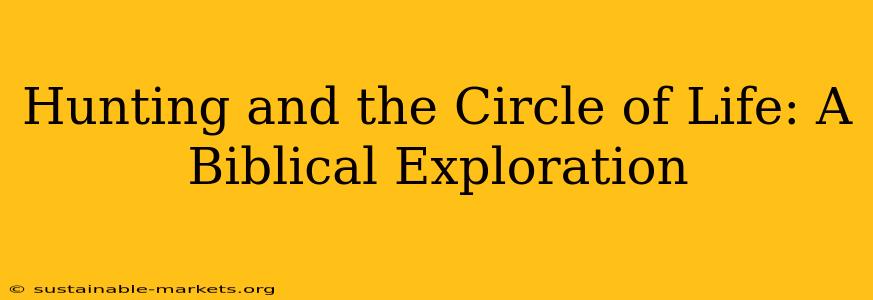Hunting, often viewed through a modern lens of conservation and ethical considerations, holds a significantly different place in the biblical narrative. Understanding its role requires moving beyond simplistic interpretations and delving into the deeper theological and societal contexts within which it existed. This exploration will examine hunting's portrayal in scripture, addressing its multifaceted nature and revealing its connection to humanity's relationship with God, creation, and one another.
What is the biblical perspective on hunting?
The Bible doesn't condemn hunting outright. In fact, it presents hunting in various lights, reflecting the diverse realities of ancient life. From the earliest chapters of Genesis, where humans are given dominion over animals, to later accounts depicting hunting as a means of sustenance and even symbolic representation, the biblical perspective is nuanced and requires careful interpretation. The key is understanding the context in which hunting is presented.
Was hunting allowed in the Bible?
The answer is a qualified "yes." God's initial command in Genesis 1:28 grants humanity dominion over the earth and its creatures. This dominion, however, carries a responsibility for stewardship and care. While hunting was permitted for sustenance, the context emphasizes respect for creation and the avoidance of wanton destruction. The later Mosaic Law provided regulations concerning hunting, primarily focusing on the ethical treatment of animals and the prohibition of specific practices considered cruel or wasteful. It wasn't a blanket endorsement or prohibition but a framework guiding ethical engagement with the natural world.
Is hunting a sin according to the Bible?
Hunting itself is not explicitly labeled a sin in the Bible. The sin comes when the act is driven by greed, cruelty, or disregard for God's creation. The scriptures repeatedly emphasize responsible stewardship of the earth and its resources. Therefore, hunting becomes problematic when it becomes unsustainable, driven solely by sport or profit without regard for conservation or the well-being of the animals. The focus is on the heart of the hunter—their motivations and actions—rather than the act of hunting itself.
How does hunting relate to the stewardship of creation?
Hunting, in the biblical context, is intrinsically linked to stewardship. The act of hunting requires respect for the animals hunted, a mindful approach to resource management, and an acknowledgment of God's sovereignty over creation. Unsustainable hunting practices, characterized by greed or indifference to the environment, are a direct violation of the stewardship mandate. Responsible hunting, however, can be part of a holistic approach to land management, contributing to ecosystem health through population control and sustainable resource utilization.
What are the ethical considerations of hunting in the Bible?
Biblical ethical considerations surrounding hunting primarily emphasize respect for life, responsible resource management, and avoidance of cruelty. The Mosaic Law contained specific regulations concerning hunting, reflecting a concern for fair practices and the prevention of wasteful killing. Beyond the specific laws, the broader biblical emphasis on justice, compassion, and responsible stewardship shapes the ethical framework for hunting. These principles call for careful consideration of the impact of hunting on ecosystems and the well-being of animals. It's a call to act as responsible stewards, not ruthless exploiters.
Conclusion: A Balanced Perspective
The biblical perspective on hunting is not a simple "yes" or "no." It's a nuanced call to responsible stewardship. Hunting, when approached with respect for God's creation and ethical considerations, can be a part of a balanced relationship with the natural world. However, when driven by greed, cruelty, or disregard for the environment, it becomes morally reprehensible. The ultimate test lies not in the act itself, but in the heart and intentions of the hunter—a crucial reminder applicable to all our interactions with creation.

